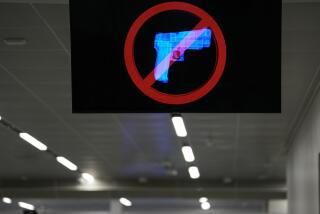Justices Curb Use of Out-of-Court Testimony
- Share via
WASHINGTON — The Supreme Court made it harder Monday for prosecutors and the police to use out-of-court statements against a criminal defendant at his trial.
In a 7-2 opinion, the justices said the Constitution gives defendants the right to confront their accusers in court, a right that cannot be whittled away by allowing statements whenever a witness is unavailable.
The ruling overturns the assault conviction of a Washington state man who was found guilty after the jury heard a statement his wife had given to police. The defendant, Michael Crawford, said the out-of-court statement should have been barred.
Monday’ opinion was written by Justice Antonin Scalia, relying on the historic and original meaning of the Constitution. He cited the trial of Sir Walter Raleigh, who was convicted of treason in England in 1603 based on a statement given to one of King James I’s men. Raleigh had asked that his accuser be brought to confront him at his trial, but the request was denied.
Afterward, England and, later, the American authors of the Constitution gave defendants a right to confront their accusers. “In all criminal prosecutions, the accused shall enjoy the right ... to be confronted with the witnesses against him,” the 6th Amendment says.
Nonetheless, the Supreme Court has long permitted courtroom use of statements by witnesses who have died, fled or refused to testify. These are known as “hearsay exceptions,” and until Monday, the court’s rule allowed the use of statements that were seen as reliable evidence. For example, a witness’s tape-recorded statement to the police would be seen as reliable and could probably be introduced as evidence if that witness were unavailable to testify.
Scalia’s opinion sets a high bar for the use of out-of-court statements at trial. “The framers [of the Constitution] would not have allowed admission of testimonial statements of a witnesses,” he wrote. “The text of the 6th Amendment does not suggest any open-ended exceptions from the confrontation requirement.”
Typically, defendants can demand that witnesses appear in court. However, witnesses who are co-conspirators in a crime sometimes refuse to testify on the grounds that it would incriminate them. The issue of out-of-court statements has also arisen in cases involving the alleged abuse of children. The courts have been divided over whether prosecutors may use a child’s statement to a counselor or the police if the child is deemed too young to testify in court.
Several lawyers who had read Monday’s opinion said they were not sure whether it would have a broad impact.
“It opens a fairly substantial question as to what is a testimonial statement,” said Kent Scheidegger, a lawyer for the Criminal Justice Legal Foundation in Sacramento.
For example, it is not clear under the ruling whether a child’s statement to an abuse counselor could be considered testimony.
Jeffrey Fisher, the Seattle lawyer who represented Crawford, described the outcome as a “landmark decision” involving the right to confront accusers.
Although all nine justices agreed Crawford’s conviction should be overturned, Chief Justice William H. Rehnquist and Justice Sandra Day O’Connor disagreed with Scalia’s opinion.
“I believe [it] is a mistaken change of course,” the chief justice wrote in a dissent, predicting it would lead to confusion. “Thousands of federal prosecutors and tens of thousands of state prosecutors need answers as to what ... is covered by the new rule.”
In Crawford’s case, after his wife, Sylvia, accused another man of trying to rape her, she and Crawford went to the man’s apartment.
The two men fought, and Crawford was charged with stabbing the other man. Sylvia gave a statement to police describing the scene.
But because a wife cannot be forced to testify against her husband, she was not called as a witness. However, prosecutors used her statement to rebut Crawford’s claim that he acted in self-defense.
In Monday’s ruling in Crawford vs. Washington, the court said the use of that statement violated the defendant’s rights.
More to Read
Get the L.A. Times Politics newsletter
Deeply reported insights into legislation, politics and policy from Sacramento, Washington and beyond. In your inbox twice per week.
You may occasionally receive promotional content from the Los Angeles Times.











